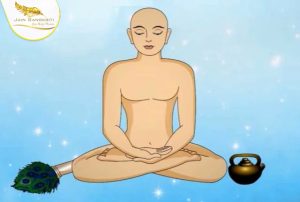The Architect of the life of Muni Paaysagar Ji

Chapter-37
It will not be an exaggeration to call Achharya Shanti Sagar Ji an architect of the life of Muni Paaysagar Ji. The credit of bringing Muni Paayasagar from mithyatva to the enlightened path of samayktva goes to Achharya Shri. Muni Shri Paaysagar Ji was a chief actor in a theatre company while he was a house-holder.
Later he lived like a revolutionary by encouraging the ‘Satyagrah’ of mill- workers against Bombay mill owners. But soon he, assuming the form of Chidambar Baba with matted hair and body smeared with cow-dung ash, reached Kashi where he came into contact with various kinds of ascetics.
In the form of a matted haired hypocritical ‘sanyasi’, he himself began to think whether he could achieve his salvation by that kind of self-deception? So abandoning the disguise of the ascetic he began to wander following his own will as a vagabond wearing well decorated clothes.
Say, it was a favourable moment that Achharya Shri Shanti Sagar arrived in Kannoor and Paaysagar Ji visited him there for the first time.
Shri Paaysagar Ji disclosed that some Jain brothers told Maharaj Shri about him that he was a depraved person addicted to every kind of sensual passion and though being a Jain by caste had no faith in ‘Namokar Mantra’. Hearing all this Maharaj Shri kept quiet.
A glow of luster and peace glittered on his face. He only said, “He has visited me today; therefore he will certainly gain some thing.”
Shri Pai Sagar Ji further said, “1 saw hi m as a spiritual magician. The seed of asceticism lying inert in my heart began to sprout. This unforgettable visit of Achharya Shri had awakened a kind of energy in my breath. God knows what happened to me? I felt as if a blind person had got eyes.”
A rampant and arrogant person of yesteryear had, by taking a vow of celibacy for the whole life, embraced ‘Seventh Pratima’ within a month. Achharya Shri was a great judge\ connoisseur of the mind. What did he see in me that when in the next month I expressed a strong desire for the consecration of a ‘ Chhullak’ position, he obliged me?
Diksha” (consecration) in Sonagiri in 1929.
I had to bear great accusations of people till I reached the position of a ‘Muni’ because my past had remained a storehouse of great passions and vices.
When I was assuming the rank of ‘Eilak’, Shri Chandra Sagar Ji, who at that time was in the congregation of Achharya Shri, had taunted/accused me that I had embraced the consecration of the “Eilak” rank without even knowing the essential properties of the “Eleven Pratimayan’.
But Achharya Shri had very well understood it psychologically that whatever I accepted, I maintained it desperately even at the risk of my life.
Divine sight of Achharya Shri had transformed my life as if an iron piece had got the touch of the Paras Stone Achharya Shri had showered unlimited kindness on me.
Achharya,Shri told me at the time of my parting, “Paaysagar! Be very careful. Always remain vigilant in your own self. It matters little what the world says, you should remain absorbed in the Yoga- Nidra Paaysagar Maharaj was a great actor.
His art became more refined after he became Muni and he began to attain popularity as an actor of the path of “moksha” (salvation). While speaking on religious matters he used to narrate/describe the feelings of nonattachment in such a manner with his art of acting that the audience savoured the feeling of non-attachment completely fascinated.
His exposition on religious texts, sinking in the savour of the self, was so heart touching that the people also sank in the savour of happiness.
In the last moments of his life his body became the home of diseases, so, he said, “The karmas I have fastened, I will have to endure the fruits myself. There is no medicine of the “Karma-disease”. He said that there were only two means of destroying Karma:
1. Meditating the nature of the self.
2. Dev.otion towards “Jinendra Bhagwan’.
He always had a feeling of obligation towards Achharya Shri and kept repeating throughout his life that Achharya Shri had made his life pure by sublimating his evils and overlooking the faults.
He expressed his feeling in these words:
- “I want to celebrate ‘Deewali’ of the qualities of my soul and want to born Holi of my Karmas’.
